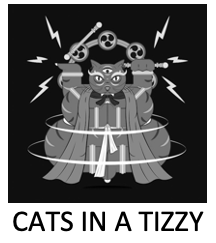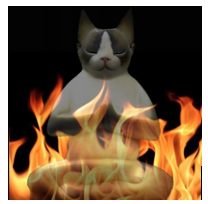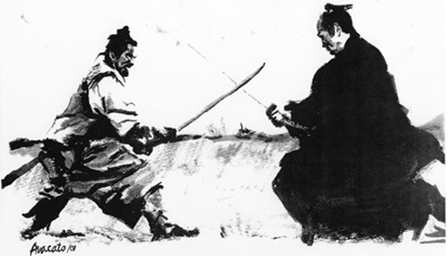This story was originally entitled The Wonderful Art of a Cat. It was written to describe the importance of spiritual elements within the Martial Arts. The original author was Ito‑Tenzen‑Tadanari, the eldest son of Ono-Jiroemon‑Tadaaki, the originator of the Ono School of Japanese Fencing. His father, Jiroemon, was the highest disciple of Ito‑Ittosai. After fighting against his rival Ono Zenki, and winning the match, Jiroemen was recommended as Ittosai’s successor. He became Ittosai the Second. In 2005 I revised this story for my own personal enjoyment which is presented here.
A Japanese Fencing expert named Shoken returned to his house to find it had become occupied by a large rat. The rat was so bold that it ran freely about in the daytime forcing Shoken to close up his house to give his cat the opportunity to catch it. Unfortunately, the rat sprang upon his cat, bit its face, and sent it away whimpering.
Shoken then gathered many excellent rat catchers from his neighborhood and placed them all in his house. However, when any cat drew near, the rat sprang upon it and bit its face.
Near exasperation, Shoken summoned his servant. “I’ve heard that there is an excellent cat owned by our neighbor,” he said. “See if you can borrow it.”
The faithful servant returned with a cat, neither wise nor quick looking. Nevertheless, Shoken placed it in his house. The rat appeared instantly scared of this cat and froze, allowing the cat to easily drew near and dispatch it in its mouth.
The other cats, despite their sharp claws and training, were surprised at their own inability to catch this rat. So that night they all gathered in Shoken’s house and politely asked the old cat how he had caught this rat so easily.
The old cat laughed saying, “You are all young and even though you have worked hard, you were never exposed to proper rat catching. You have not learned what to do against an unexpected opponent. However, before I tell you my secret, let me hear about your training methods.”
The black cat spoke first. “I was born into a family of expert rat catchers. I can jump over a folding screen as high as seven feet and pass through a very tiny hole. Since I was a kitten, I have trained myself as an excellent jumper. I have never failed to catch a rat whether it ran on the beams of the house or under any other circumstances. But today, I met an unexpectedly strong rat which I could not catch.”
The old cat replied, “You have only trained how to catch a rat by ‘aiming’ at your opponent. In olden days, our master required we study the ‘final principles.’ You have attempted to master technique that strays from these principles. I hope you consider this point.”
A large cat, like a tiger, stepped out saying, “I think it is important to master the spirit of rat catching. Considering that I have mastered this, I have never failed to follow a rat whenever it ran and placed it under my feet. I have caught rats running on house beams without preparation. But this rat showed no figure while it ran about. Can you tell me why?”
The old cat replied, “You are filled with conceit, active only when victory appears certain to you. This attitude cannot be admired. Try to break and leave, and your enemy may try to break and come forth. Try to cover and crush, and your enemy may also try to cover and crush. What happens if some area remains which you are unable to cover? How can you believe that you are always strong and your enemy is always weak? Even though you say you have mastered the spirit of rat catching, you suffer from an illusion that this is Mencius’ vast‑flowing vigor. Though it appears similar, it is quite different. Relying on your vigor when your victory is certain is like comparing the normal currents of a river to the temporary currents of the flood. Suppose you meet a superior opponent? What then of your tactics? There is an old saying: ‘Watch the courage of a cornered rat!’ Such a creature will attack with complete desperation. It will rely only on itself and no one else. It will not cling to its own life; rather, it will forget all its own selfish desires. Such a rat cannot be caught by you.”
Next, a little old grey cat stepped out quietly and said, “I have been training hard and also placing emphasis on the spirit. I am not conceited, I do not like fighting, and I wish to be friendly. If my enemy is stronger than myself, I follow him instead. Even a strong rat could not be my enemy. But I was unable to either beat or make a friend of today’s rat. I have never seen such a rat that behaved like a God.”
The old cat replied, “Your tactic is useless. What you term ‘friendly’ is an unnatural feeling and desire. Your enemy is quickly aware of your intentions to avoid his attack. Attempting such behavior is abnormal. If you had truly acquired Mencius’s vast‑flowing vigor, you could accomplish anything you wish. If you are unable to gain the respect of your enemy and suddenly attacked, you will have no means of defense. I hope you do not find my counsel hard to follow.
In olden days, there lived a cat in our neighborhood that slept all day. It looked like a carved wooden figure. Nobody ever saw it catch a rat, but wherever it went, we found no rats. This was true even if the cat was transferred from place to place. I visited this cat once to ask why this was true. I asked four times, but it never answered me. To tell the truth, it did not know how to answer. One who knows all, does not tell; one who tells, does not know. The cat in question forgot itself and forgot everything. I found that I was indeed inferior to it.
Shoken, the Japanese Fencing expert, also paid his respect to the old cat and said, “I have practiced Japanese Fencing very hard, but to my regret, I have not yet mastered it. This evening, however, I believe that I have understood a secret about martial arts after listening to your discussion.
“I am an animal which lives on rats,” the cat said. “How would I know about human problems? But I can tell you that Japanese Fencing should not consider victory alone. In an emergency, a man should know the vital lesson of how to live or die. To solve a life or death problem you must be without doubts or prejudices. A mind calm and free will be ready in any emergency. When fighting an enemy most men are not free and thus cannot properly combat their opponents? Even if you are victorious, such victory is blind if your spirit has no shape. If you are too vigorous, you will be unable to stop at the proper place. If you are not vigorous enough, you will be unable to fight. Do not cling to a single thing. Your mind must be free to fight against your enemy at any moment. In short, there should be no enemy. There should be no self. In this manner you will always be ready for whatever comes.”
Hearing this, Shoken asked, “What do you mean when you say there should be no enemy and no self?”
The old cat answered, “If there is no self, there will be no enemy. If nothing is in your way, there cannot be a dispute. This means that there should be no enemy; there should be no self. To be free there should be nothing favorable or unfavorable. To understand this, you must reflect upon yourself. Your master will teach and attempt to enlighten you, but it is your responsibility to grasp the truth. Self‑realization is always a tacit understanding between teacher and disciple. No master can explain such truths to you. Warriors, Zen Masters, men of virtue, artists, etc., will say that things worth mastering must be understood tacitly. They can only point out the things which you possess, but which you have been unable to realize and activate within yourself. Nothing can be given to you by any master or teacher except the direction to where the truth can be found. It is easy to listen to what you are taught, but difficult to find what you have within yourself and to master it as your own. This is called self‑realization. When it is grasped, you will feel as if you’ve awakened from a foolish dream. I shall be happy if you understand that the essence of swordsmanship, of martial arts, and of rat catching is not the strength, nor even the art, but that which is hidden deep within you.

When I first posted Of Swordman and Ratcatchers, a reader sent this response:
“The latest story … feels very Zen. It’s interesting to me, but I also find it frustrating. All these cats are practicing and trying, but apparently, they’re all doing it wrong because their minds are in the wrong place/state. I think most frustrating is that there is no clear “right” way that the old cat describes. He seems to advocate balance and self-emptying, but I don’t think he provides any of the others with a realistic method to achieve this enlightened state. … I feel like this is a typical complaint of a [martial] student struggling to learn these ways – if only our language could better communicate our mental states.”
I agree with his assessment. This has been a bug in American sensei’s headbands. Who’s talking in depth about the mind in martial arts outside of the temple monks? Can these cats really figure out Menscius’s vast-flowing vigor by themselves? Many sensei don’t have clear answers on this subject because they are dancing on the same hot zen roof. To shed light on this dilemma, let’s follow what these cats did after the swordsman, Shoken, left them.

Cats on a Hot Zen Roof
Part II
By Hayashi Tomio
The cats, realizing they didn’t have a clue how to further advance their studies of rat catching, pleaded with the old cat to give them further insight into the proper way to train.
Luckily, they found the bewhiskered sage in a good mood and willing to talk.
“Ah! Sadly, dogs aren’t the only species that suffer from ignorance,” the old cat replied. “Let’s see if I can teach you fellows some new tricks.”
Despite great effort, the three cats managed to put enough of their egos aside to listen to his advice. (In truth, it is never this simple. Half the battle is detaching from the ego, which is the very cause of the cat’s faulty tactics in the first place).
“The true power of rat catching and swordsmanship lies in linking your physical training to your mental practices,” the sage cat began his lesson. “The reason that even the most serious and diligent of you rarely achieve higher skill is the lack of understanding how your physical practice relates to your breathing and concentration techniques. Of course, you’ve gotten encouraging results from your current efforts at rat catching, but they remain mostly superficial gains. Let me tell you of the legend of a twelve-limbed cat who lives in the Land of No Rats. He is considered the supreme rat catcher, the Buddha of Mice Mincers! Just looking into his eyes, a rat is instantly slain. It is said that any cat that fully comprehends the nature of his eight limbs inherits his power.”
At hearing this, all three cats fell into an immediate confusion. As far as they could see, they had only four limbs apiece. They were beginning to doubt the old cat’s mental health.
“There you go again,” the Master said repudiating the group. “You are filtering out my wisdom to fit your own mindsets. This way will never work for you. Yes, I can see you only have four legs beneath you. But they support your material world. You have eight additional limbs supporting your spiritual world. Open up your third ear and listen up. I will explain each of the eight limbs of this infamous Buddha Beast.
His first limb is called Self-Restraint. It is the limb of behavior that keeps you at peace with the world. Have you ever deeply evaluated your own behaviors? Can you see the long-term outcomes of your current actions? What you cats don’t realize is that an absence of past indiscretions frees your mind in the present and prevents negative karma. Also, a mind free from past concerns is not only at peace but able to focus deeply. The old cat spread his right paw revealing five exceptionally sharp claws. “Each claw of mine represents a principle of self-restraint. The first principle is Non-killing. Ah yes! I know what you are going to say. You are cats! You kill rats. This is true. But I am not referring to that which is intrinsic to your nature but to a blood lust, unjust, unnecessary violence. The other four claws are Truthfulness, Non-stealing, Sexual Continence and Non-covetousness.
The second limb is called Observance. To make sure you do not fall back upon your old habits, Observance sees to it that you hold to the above five principles with consistent practice. Purity of action, contentment, austerity, the study of self-development through the classics, physical discipline, honoring your teacher, and surrendering your ego to the ultimate universal power, these are natural extensions of self-restraint.
The third Limb is called Physical Practice. This is where most swordsman and rat catchers begin and end their training. Overdoing physical practice creates a superficial learning plateau. Solely developing your physical nature is not enough. Sitting meditation will strengthen your central nervous system and open your channels of energy circulation. The highest masters combine self-cultivation practices with their hunting and warrior skills as the natural and ultimate progression of their development.
If you want your art to lead to higher consciousness you must take root within this eight-fold framework. You can begin by recognizing it as a psychologically significant level. It is also here where you will find the most noticeable rewards of excellent health—a central pillar for any skill.
The fourth limb is called Proper Breathing. Breathing exercises accelerate the production of Ki or Prana. However, you must not presuppose that feeling energy traveling through your limbs or spine is the ultimate training goal. Such practices will improve your skills dramatically, and a diligent swordsman or rat catcher will surpass the normal person in strength and fighting ability, but you must beware of sole preoccupation with these gains: the highest levels of martial ability are not reached until additional levels of meditation have been discovered.
The fifth limb is called Sense Withdrawal. You must train to pull your five senses back into your mind to detach from the stimuli generated from your surrounding environment. This stage is the precursor of internal listening. It is your first introduction to spiritual life.
The sixth limb is called Concentration. Concentration is only possible once sense withdrawal has begun. Refocusing your senses on a single concentration point like the tip of your nose will turn your mind inward. The breath and senses merge at the nose tip to open the central nervous system in a way that is not possible by feeling any limb or even your whole body. The nerves connecting the nose to the brain enhance the bioelectric nature of your breath.
If you can inwardly focus on such a point without distraction or interruption for just twelve seconds, you have achieved Concentration.
The seventh limb is called Meditation. This is the unbroken flow of the mind on a single point for an extended period.
Most of your minds will be interrupted from this task by either physical or emotional considerations. Worldly matters can force their way into your mind just as your concentration is achieved.
Each attempt is like doing pushups. The first time you try, you will only do a few before your muscles ache. But years down the road, if you practice hard, doing a couple hundred will feel invigorating.
The last limb is called Superconsciousness. This is a state of union where you lose your individuality an enter Menscius’s vast-flowing vigor. Just as the river joins the ocean, the individual self joins the Supreme Ocean of Absolute Consciousness.
At this level, the swordsman and the rat catcher reach peak evolution. It is here that you will discover where all of the great esoteric traditions merge into one, beyond all cultural inflection.
If you structure your physical practices correctly with your mental practices you will reach the highest levels of achievement where no rat, or enemy, no matter how fierce, can stand in your way. Now go. Absorb what I have told you. Put all your limbs, the visible and invisible, to work. Let us meet again in one year’s time. Then you can tell me if what I have told you has been wise counsel or not.”

